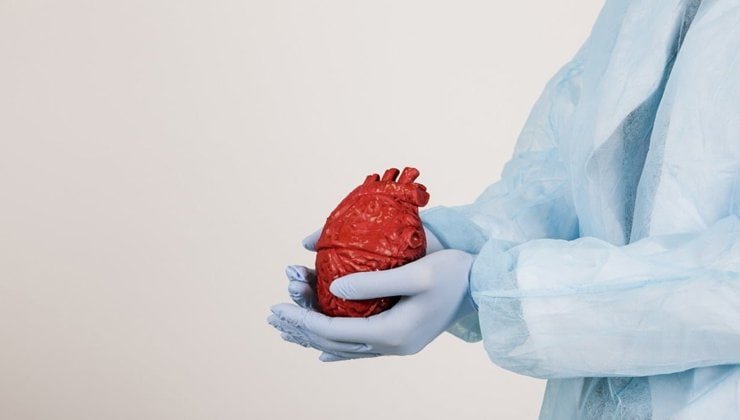Introduction
Open heart surgery is one of the most significant life-saving procedures performed today for treating different heart conditions. It involves the directly accessing the heart through the chest. Advancements in technology has made some heart procedure less invasive, but open heart surgery still remains essential for addressing severe cardiovascular issues that can not be managed through medications or less invasive treatments.
In this post, we will explore the common reasons why open heart surgery may be necessary!
Overview Of Open Heart Surgery
Open heart surgery refers to the procedures performed for treating heart problems by directly accessing the heart by opening the chest.
In this procedure, the surgeon will cut through the breastbone and spread the ribs to access the heart. The surgeon will directly access the heart and perform the appropriate treatment on the heart muscles, valves or arteries.
It can be on-pump open heart surgery, where the heart will be stopped, and the patient will be connected to a cardiopulmonary bypass machine or off-pump open heart surgery, where the heart will not be stopped, and a cardiopulmonary bypass machine is not required.
Who Is The Good Candidate For Open Heart Surgery?
A good candidate for open heart surgery typically has a serious heart condition, including coronary artery disease, heart valve disease, aneurysms, or congenital heart defects, that can not be effectively treated with medications or minimally invasive procedures. The different factors that may help to decide to perform an open heart surgery are
- The severity of your symptoms
- Location of the coronary artery blockage
- Age of the patient
- Presence of co-morbidities
Open Heart Surgery Procedure
The different steps in the open heart surgery procedure are
The surgeon will then close your breastbone and incision with sutures.
The surgeon will perform specific tests, including blood tests, chest x-rays, EKGs, and urinalysis before the surgery.
You will be placed under general anaesthesia.
If you are undergoing an on-pump procedure, you will be placed on the cardiopulmonary bypass machine.
The surgeon then performs a sternotomy, which involves creating a long incision in the chest near the breastbone.
Depending on the procedure, the surgeon may stop the heart to perform the repair. The surgeon then performs the appropriate procedure.
Once the procedure is complete, you will be removed from the cardiopulmonary bypass machine.
Understanding The Need For Open Heart Surgery
Open heart surgery is recommended if you have been diagnosed with one of the following heart conditions and the surgeons need direct access to your heart, including:
Coronary Artery Disease
One of the most common reasons that an individual may need open heart surgery is coronary artery disease.
Coronary artery disease occurs when the coronary arteries which supply blood to the heart muscle become narrowed or blocked due to the buildup of fatty deposits called plaque. It may reduce the blood flow to the heart causing chest pain, shortness of breath, and heart attacks.
In cases of severe coronary artery disease, coronary artery bypass grafting is required, which is open heart surgery.
Procedure:
- A graft is created by removing a healthy artery from the chest, arm or leg
- An incision is made down the centre of the chest through the breastbone.
- The surgeon will take the harvested blood vessel and attach the harvested grafts above and below the blocked portions of the coronary arteries. It helps to bypass the blocked or narrowed areas of the coronary arteries.
- After the grafts are secured, the surgeon will close the incision.
Heart Valve Disease
Heart valve disease is another major reason for open heart surgery which can impair the heart’s ability to circulate blood effectively throughout the body. The heart has four valves, including aortic, mitral, tricuspid, and pulmonary valves and when these valves become diseased or damaged, it may lead to serious complications.
Open heart surgery may be required to repair or replace an affected heart valve that does not function properly.
Procedure:
- A surgeon makes a vertical incision down the centre of the chest and separates the breastbone to access the heart.
- The surgeon may repair or replace the heart valves with mechanical or biological valves.
- The surgeon may close the chest to bring the breastbone back together.
Heart Transplant
A heart transplant is a complex, life-saving surgery that is done to replace the heart with a donated heart. It is done when a person has end-stage heart failure when the heart has permanent damage.
Procedure:
- Your surgeon will put you on a general anaesthesia. You will be provided with a blood thinner to reduce the risk of blood clots.
- The surgeon makes an incision along the chest to access the heart.
- In many cases, a heart-lung machine is used to take over the function of the heart and lungs.
- The diseased heart is removed leaving a small portion of the right atrium
- The donor’s heart is carefully placed into the chest cavity and the vessels. The surgeon reattaches the blood vessels and then the incision is closed.
Congenital Heart Defect
Congenital heart disease refers to a heart abnormality that is present at birth which may affect the structure of the heart and disrupt the normal flow of blood through the heart. The issues can be a hole in the heart wall, issues with the blood vessels, and problems with the heart valves. It can be life-threatening and require immediate medical intervention, including open heart surgery.
Procedure:
- The patient is placed under general anaesthesia
- A surgeon makes an incision down the middle of the chest which allows access to the heart. A heart-lung machine may be used.
- The surgeon may perform, closing holes in the heart, repairing or replace damaged heart valves, opening narrowed blood vessels or arteries, and placing a graft or shunt to bypass a blockage.
- After the surgery is complete, the surgeon closes the chest cavity and the skin incision is sutured.
Aneurysms
Aneurysm surgeries are done to treat aortic aneurysms when aneurysms are formed in one of the heart’s main blood vessels. An aortic aneurysm, if left untreated, will damage the aorta and cause life-threatening complications. Open heart surgery may help in preventing an aneurysm rupture or dissection.
Procedure:
Your surgeon will close the incision with stitches or staples.
Your surgeon will make a long incision in the skin to open the chest or belly after administering general anaesthesia.
The surgeon may use clamps to block blood flow from the sections of the aorta above and below the aneurysm.
The surgeon will repair or replace the affected part of the aorta of the heart using synthetic grafts or prosthetic materials to replace the damaged area.
Wound care
After heart bypass surgery, there will be several incisions in the chest and in the leg or arm. Proper care of these incisions is necessary to prevent infection and ensure proper healing.
The key points to be followed for wound care are
- Keep the wound area clean and dry. Follow the doctor’s instructions to clean the chest incision.
- Avoid the use of scented soaps, oils, creams, or powder on the incision area.
- Avoid scratching the wound area.
- Avoid tight or restrictive clothing which may irritate the incisions.
- If you notice signs of infection, including redness, warmth, swelling, or drainage, contact your healthcare provider immediately.
Managing pain
You may experience some discomfort or pain at the incision site after a heart bypass surgery. Managing pain at home is important for a smooth recovery.
Your healthcare provider will prescribe medications to help overcome pain and discomfort. So, it is important to follow the prescribed pain management plan and seek medical attention if the pain becomes unmanageable.
You may also use natural pain management strategies, including relaxation techniques, meditation, and deep breathing exercises, to help reduce stress and anxiety that may exacerbate pain.
Activity
Regular exercise improves heart health and speeds up the recovery process. After the heart bypass surgery, it is important to gradually get back into physical activity.
You may start with light activities, including walking and gentle stretching and your cardiac surgeon may recommend a personalized exercise regime.
The exercises should help to strengthen the heart and improve cardiovascular health without overexertion.
Read Also:- Best Exercises After Bypass Surgery
Lifestyle modifications
The different lifestyle modifications that are to be followed at home are
- Follow a heart-healthy diet: After the heart bypass surgery, it is essential to focus on a heart-healthy diet to help with the healing process and improve overall heart health. You may incorporate a variety of fruits, vegetables, whole grains, lean proteins, and healthy fats into the meal. Avoid processed foods, sugary snacks, fried foods, and foods rich in saturated fats.
- Stay hydrated: Proper hydrated is required for the recovery process at home. Drinking plenty of water and avoiding overconsumption of caffeinated or sugary beverages is preferable.
- Avoid smoking and alcohol: Smoking and alcohol may affect the heart bypass surgery recovery process and increase the risk of further heart complications. Avoid smoking and consuming alcohol during the recovery process at home.
Read Also:- Diet After Heart Bypass Surgery: Foods to Eat & Avoid
Conclusion
Open heart surgery is a life-saving procedure for treating severe heart conditions, including coronary artery disease, valve disease, congenital defects, or aneurysms. The advancements in surgical techniques have greatly improved the outcomes.
If you experiencing any symptoms of a heart condition, It is preferable to consult with your healthcare provider to understand your treatment options, including open heart surgery.
If you are considering open heart surgery and have questions regarding the procedure, feel free to book an appointment at Heart360 Care!
Frequently Asked Questions
The signs of needing open heart surgery include chest pain, shortness of breath, extreme fatigue and unexplained swelling in the legs or abdomen. If these symptoms are severe and persistent, surgery may be required to prevent unwanted complications.
Open heart surgery is a major complex procedure and can be serious due to the complexity of accessing the heart and potential risks involved, including infection, bleeding, blood clots, and stroke. However, if the surgery is performed by a surgeon with a lot of experience and with advancements in surgical techniques, the success rate for the open heart surgery have significantly increased.
Lifestyle changes, including healthy diet, regular exercise, avoiding smoking, and controlling stress may reduce the risk of heart disease and the need for heart bypass surgery. However, in individuals with already advanced or severe heart conditions, lifestyle changes alone may not be enough to completely avoid the need for bypass surgery.
People with severe comorbidities, including advanced cancer or severe lung disease may not be suitable candidates for open heart surgery. Age and overall health play a significant role in determining if you are a good candidate for open heart surgery.









